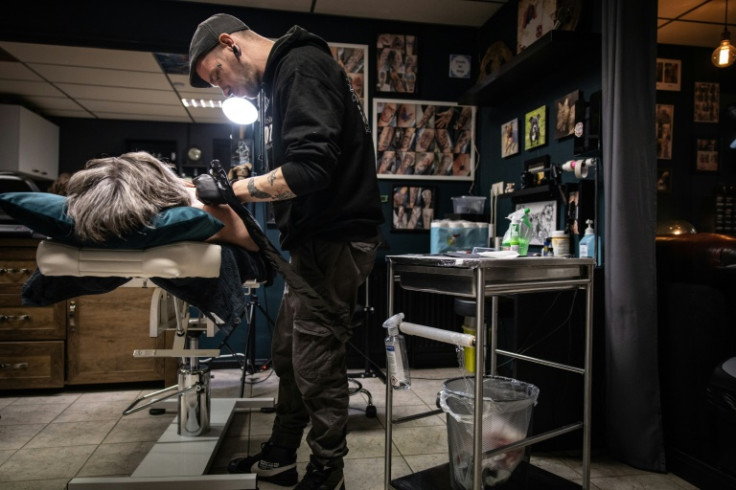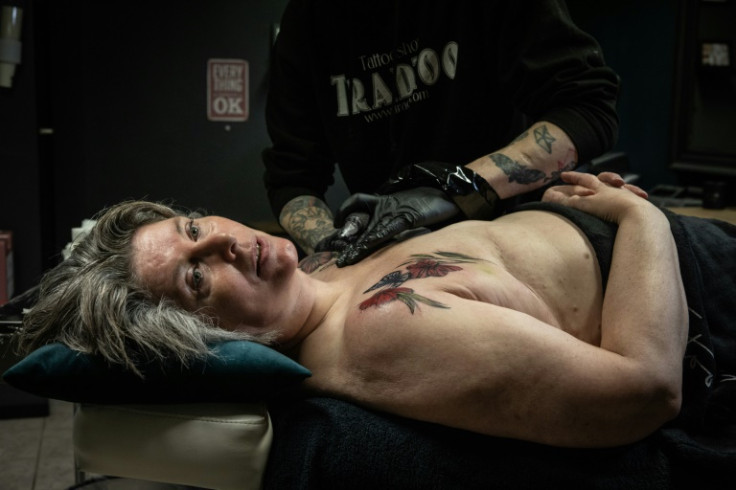Free Tattoos Give Hope For Dutch Breast Cancer Survivors

Flowers and butterflies surround the scars left by the removal of Jacqueline van Schaik's breasts, thanks to a new tattoo the cancer survivor says she treasures.
"It's magnificent," exclaims an emotional Van Schaik, 56, looking at herself in the mirror at the end of the session at a tattoo parlour in the central Dutch city of Lelystad.
"I don't see the scars anymore. I only see this gem," added the mother-of-one, who underwent a double mastectomy after being diagnosed with cancer in October 2020, followed by extensive chemo- and radiotherapy.
Her tattooist, Darryl Veer, is part of a growing group of ink artists ready to help women love their bodies again after the traumatic experience of a mastectomy.
Around one in seven women in the Netherlands develops breast cancer during their lifetime, Dutch health authority figures said.
Breast removal is necessary in a third of these cases, according to a Dutch website specialising in cancer.
Myriam Scheffer, 44, suffered the same fate. She too wanted a tattoo on her chest -- "most probably a large bird spreading its wings" -- but her scars have not yet healed enough.
In the meantime, she decided to help others like her by setting up a foundation last year to offer free tattoos to women in the same situation.
Van Schaik is the first-ever recipient.
The idea of tattoos for breast cancer survivors already exists in the United States and France, but Scheffer, who has an eight-year-old daughter, hopes to develop the initiative across Europe.
Interested women can contact her from June on her foundation's website, tittoo.org.
There, they can meet the tattoo artists, plan the artwork and sessions, set for October to raise awareness for breast cancer screening.
Thanks to her foundation, Italian and Swedish women will be able to do the same later this year, most likely in Florence and in Stockholm, where there are active groups of so-called "flatties" or "flat women", Scheffer said.
She hopes to expand the scheme to Belgium and Germany in 2024.
Scheffer's foundation only works with tattoo artists who, like the 36-year-old Veer, already have experience of covering up scars.
After three sessions with Van Schaik, each lasting several hours, the tattoo artist looked visibly relieved.
"I was under pressure, because the last thing I wanted to do as an artist in a case like this is to mess up," Veer laughed.
"Making somebody happy really is the most beautiful thing you can do with a tattoo."
Schaik's chest is now covered up to the shoulders with two red flowers, whose stems seem to take root at the bottom of the scars, and blue butterflies.
The tattoo artists work around the scars but do not ink them directly.
"To see yourself as beautiful and to like yourself again: it's such as precious feeling and I had lost it," Schaik told AFP.
The operation "took something essential away, a part of what makes you what you are, and that made me very sad," said Van Schaik, who suffered "every side effect imaginable" during her two-year treatment.
When hormone therapy didn't work, Van Schaik, who has a 17-year-old son, opted for a mastectomy in April 2021.
But losing her breasts meant she "suffered a lot, physically and mentally."
"Every day I stood in front of a big mirror when I got out of the shower. I looked at the scars and I saw what had been removed from me," said Van Schaik.
"I thought of taking down the mirrors at home. But now, they can stay."


© Copyright AFP 2024. All rights reserved.





















